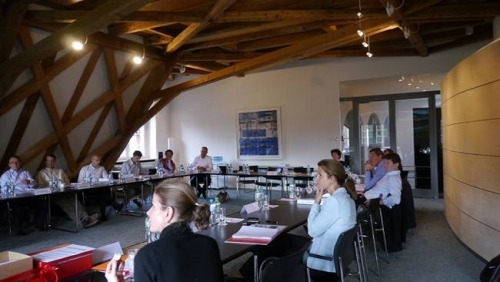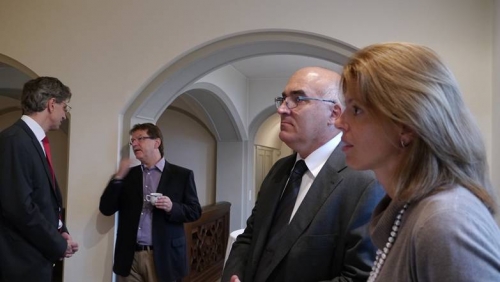Strategy
EXCLUSIVE: Big Lessons From The Swiss Finance Institute's International Wealth Management Retreat

A wealth management retreat near Zurich, organised by the Swiss Finance Institute, gave this publication much food for thought, having been granted the exclusive right to join the discussions.
Listen to clients closely, learn how other industries embrace change; ensure senior management talks to customers, and focus totally on asset quality, not on sheer volume. These were some of the take-home points from the Swiss Finance Institute Wealth Management Retreat at the Credit Suisse Bocken Estate, near Zurich.
In a comfortable environment where free-ranging discussion – held off the record – was encouraged, senior figures from the Swiss and global wealth industry discussed topics such as “Corporate Governance for Banks in the `New Normal’”; “How to Lead Through Regulation”; “Real Estate Investment, Local and Global Spectrum”; “Facing the Demographic Challenge Now”; and “Emerging Business”.
Your own correspondent was honoured to take part in the retreat and gave a talk, followed by a discussion, around the theme of “Excellence in Leadership in M&A and Industry Consolidation”. Given the recent flurry of activity in wealth management mergers and sales, there was plenty to talk about over the three days from 25 to 27 August.

The sessions were led by Dr Gabriela Maria Payer, head of education at the Swiss Finance Institute and member of the SFI’s management board. ( Dr Payer has also been a member of the judging panel for the WealthBriefing Switzerland & Liechtenstein Awards 2014, the results of which were announced in Geneva earlier this year.)
This is an industry going through upheavals and often painful change, with regulatory and compliance burdens an ever-present feature. It is often stated that Switzerland’s 300-plus banks are ripe for consolidation, and there are shakeouts likely for firms in other countries. But it is mistaken, as attendees realised, to become despondent, particularly as figures continue to show that the stock of global wealth and ranks of the world’s high net worth individuals, are expanding.
One of the liveliest discussions happened when, after hearing about some of the problems in managing change, the audience wrestled with practical ways to improve how organisations work. For example, it was pointed out that a very effective and simple way, for a wealth management firm to improve performance is to get the CEO and top management to deal regularly with end-clients. Another point is to realise that building trust cannot be easily done through technology – although technology can be a great help in improving how business operates.
One discussion, led by Credit Suisse’s Iqbal Khan (chief financial officer of private banking and wealth management at the firm), considered the proper and not-too-proper ways to incentivise employees. A focus on attracting net new assets and looking mainly at volume is a mistake, he said. Far better to concentrate on the quality of the assets brought in, both in terms of contribution to revenue and profit.
Another theme that emerged that particularly struck your correspondent is that firms should not get too hung up around what is meant by “independence”. During the talk of Andrew Hogan of PwC, it was pointed out that the UK’s recent Retail Distribution Review reform programme divides the options for clients between “independence” – where a firm must offer products/services from the total known financial universe – and “restricted advice” – where the firm has narrowed down the field somewhat. But as the discussion heard, clients expect wealth managers to employ their knowledge on their behalf. Sifting through the often bewildering array of options is part of what a trusted advisor is paid to do. So a “restricted” option does not mean “narrow”.
While some of the discussions – such as around trends in property markets – had a strong Swiss orientation, other sessions were global in scope. For example, Andrew Hogan, a partner at PricewaterhouseCoopers, gave a talk called “Navigating To Tomorrow: Serving Clients and Creating Value” that would apply as forcefully to Los Angeles, Hong Kong or Paris.
The sessions were rounded of by a plenary discussion under the title, “Leadership Through Dynamic Decisiveness”, with inputs from the high-powered collection of attendees.

The figures at the event included some of the highest-ranking figures in the wealth management industry, such as Jürg Zeltner, CEO of UBS Wealth Management; Iqbal Khan, as mentioned earlier; Christoph Weber, head of private banking at Zürcher Kantonalbank; Stephen Richards Evans, head of Standard Chartered Private Bank for Asia, Europe, Africa and Middle East. There were also representatives from the academic world, such as Heike Bruch, professor and director of the Institute for Leadership and Human Resources Management at the University of St Gallen; Rüdiger Fahlenbrach, professor at the Ecole Polytechnique Fédérale de Lausanne, as well as figures such as Urs Philipp Roth-Cuony, chairman of the Liechtenstein Financial Market Authority; Rainer Strack, senior partner at the Düsseldorf office of Boston Consulting Group; Donato Scognamiglio, CEO at IAZI/CIFI, and his colleague, and chairman of the same organisation, Philippe Sormani.
The Swiss Finance Institute, which is a private organisation created in 2006 by the Alpine state’s banking and finance industries, in association with major universities, put on the retreat so that senior figures in private banking could discuss sometimes contentious issues – such as M&A – in as free-ranging a form as possible. As far as your correspondent is concerned, the SFI certainly achieved that objective and gave attendees a great deal of food for thought.
To find out more about the Swiss Finance Institute, click here.